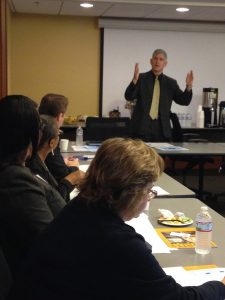Spotted among the usual backpacks and ballcaps on campus last week were the padfolios and pantsuits of the state and district staff of the North Carolina delegation to Congress. These staffers oversee the home offices of the Senators and Representatives that represent North Carolina in the U.S. Congress, and they visited campus on October 23rd for a full day of meetings to learn more about Duke’s programs and their impacts in the state.
Held every other year and co-hosted by the university’s Office of Federal Relations and the DUHS Office of Government Relations, the event serves as a reminder that Duke is an invaluable resource for information and programs that impact the constituents and interests of each of North Carolina’s representatives to Congress.

Michael Schoenfeld, vice president for public affairs and government relations, kicked off this year’s visit by welcoming the group with anecdotes and facts about Duke and its reach in North Carolina and then turned things over to Dan Struble, associate dean for external relations at Duke University Divinity School.
“True or False, 42% of Duke Divinity graduates remain in North Carolina after graduation?” asked Struble.
“True?” hedged a staff member.
“Good guess!” sang Struble, who devoted his session to teaching the group about education and outreach initiatives of the Divinity School and how the school is uniquely positioned, both physically (the chapel is at the heart of campus after all) and intellectually (Duke Divinity is home to the Theology, Medicine, and Culture Initiative), to address complex global questions facing society today.
Next on the agenda was an optional tour of the Duke Chapel, where the participants learned about the history of the chapel, the origin of the stone used in its construction (it’s Hillsborough bluestone, btw), and the contributions of those buried in the chapel’s crypt.
The group then directed its attention to the more technical side of Duke, with a session highlighting some of the Science, Technology, Engineering and Math (STEM) education research and initiatives that are making an impact on students across North Carolina and beyond.
Administrators and faculty outlined STEM-focused initiatives at Duke, from programs aimed at recruiting and retaining populations underrepresented in engineering and the sciences to state-of-the-art science education resources for K-16 teachers and their students.
Many of these programs show elementary or high school students how “science is not a silo that a group of smart people go and do ‘over there.’ It’s something that you, and you, and you do,” said Rochelle Schwartz-Bloom, director of the Duke Center for Science Education, during an enthusiastic discussion with the district staff about the Duke initiatives.
Gary Ybarra, professor of electrical and computer engineering, discussed his work sculpting TechXcite, a curriculum for after-school programs that aims to strengthen interest in and understanding of engineering topics for 11 to 14-year-olds. The initiative, a partnership between the Pratt School of Engineering and 4-H, goes way beyond the agricultural programs for which 4-H is traditionally known.
After much lively discussion showcasing the STEM initiatives, the group moved on to lunch, where they were joined by student veterans who are currently pursuing Duke degrees with the support of VA education benefits.
The number of undergraduate, graduate and professional students at Duke receiving benefits like the Post-9/11 GI Bill has increased by 451 percent in the last four years — from 35 in 2009 to 158 today. In fact, this group is Duke’s fastest growing student population, and the students attending the lunch spent their time talking about their studies, their reasons for choosing Duke, their military experiences, and, of course, their future plans.
The state and district staff then headed over to Duke Medical Center to meet the DUHS government relations team, who filled the remainder of the day with facilities tours and sessions about resources like community cancer programs and constituent-patient services.
Congressional State and District Staff Day takes a lot of legwork and cooperation among our colleagues on campus to execute successfully, and, as usual, OFR is indebted to all who participated to make the day so substantive and engaging. And, above all, we appreciate the state and district staff for dedicating an entire day’s work to learning more about Duke and all that it does to benefit North Carolina and our nation as a whole.
